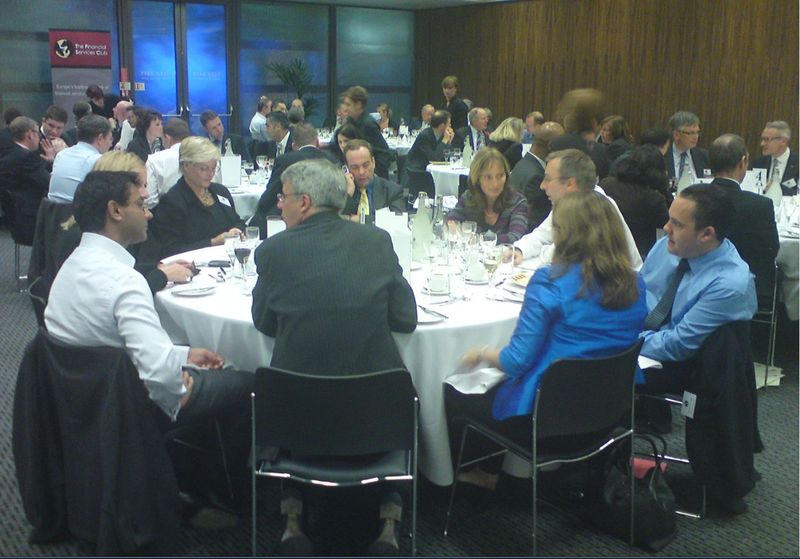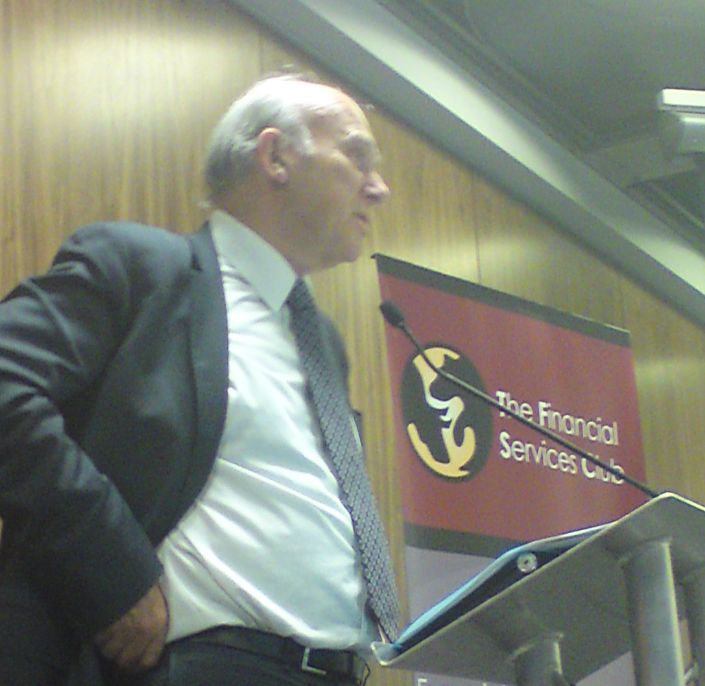
Earlier this week, as mentioned, we looked forward to a fine dinner with Vince Cable at the Club and a fine dinner it was.

Dr. Vincent Cable to give him his full title - or Vince - is the author of the Storm: The World Economic Crisis and What it Means, a book about the reasons for this crisis which he attributes to risk, greed and unfettered housing market lending.
He's also a bit of a futurist. For example, Hansard records that he asked then
Chancellor Gordon Brown the following question in Parliament back in November 2003:
"On
the housing market, is not the brutal truth that with investment,
exports and manufacturing output stagnating or falling, the growth of
the British economy is sustained by consumer spending pinned against
record levels of personal debt, which is secured, if at all, against
house prices that the Bank of England describes as well above
equilibrium level?
"If the Bank of England is correct in its
expectations of a market correction and rising interest rates, what
action will the Chancellor take on the problem of consumer debt, which
is rapidly rising, with 8 million annual visits from the bailiff?"
Gordon Brown replied:
"The honourable gentleman has been writing articles in the
newspapers, as reflected in his contribution, that spread alarm,
without substance, about the state of the British economy."
A bit of a come-uppance there me'thinks.
The evening was organised by the Club in partnership with the Industry & Parliament Trust (IPT), and IPT Chief Executive Sally Muggeridge made the introductions.
It was clear from her comments that Vince Cable is one of the few MP's whose star continues to rise, although his moment is always yet to come.
After our expenses scandal, this holds true as Dr. Cable was one of the few who did not make claims for porn films, second homes or duck houses in the pond. Equally, he is respected by most for his quiet authority on the economy and banking due to his background as Chief Economist with Shell previously.
He is certainly one of our few politicians held in high regard these days, which is really saying something.

Dr. Cable covered a wide range of topics from the credit crisis to the housing crisis, from banker's bonuses to banker's morals and ethics, from the role of the EU to the future of Britain's economy.
He equally had a fair old grilling from the audience.
The net:net is that the mood right now is ugly. Although the UK's financial firms have a good story to tell, the way in which the media perceives this is creating friction amongst all, even though it is only a small, select few who cause the problems.
However, like having one rotten apple in the barrell, it soon affects the rest.
I equate it a little bit to being like the old days of football hooliganism, where a few nutters caused the whole of British football to almost collapse as a popular sport.
We still have a few football thugs around but, by the industry working together with the police, the community and using the latest technologies, we got it sorted out generally.
This is how I see banking going.
The fact is that the days of individuals making banking decisions will disappear and we will move to risk management being more like microfinance.
In microfinance, the whole community are liable for the loan and if one person defaults or steps out of line, the whole community step in to manage the issue.
Similarly in macrofinance, we could use these policies.
This would mean that a Goldman Sachs or Barclays Capital trader will still be taking high risk, high return decisions to create alpha profits but those decisions, actions and risks will be transparent to everyone inside the bank, as well as to the regulatory authorities. As a result, if anyone sees a risk of over-leveraged losses, they will be able to step in sooner rather than later.
Equally, the future investment bank will be split off from mainstream banking so that, if those risks break the bank then so be it. There will not be any customer deposits from high street consumers or payments systems via ATMs put at risk, because that part of the banking market will have been taken out of these risks in trading.
Anyways, returning to Vince Cable, I haven't quoted from him or Sally in this write-up, but that is because it's all under Chatham House rules. We do have a podcast of his speech available however for registered Club members.
Oh yes, and if you're interested, we are just launching a remote membership to the Financial Services Club for those who just want to see the speeches, presentations and research, but cannot attend meetings.
Feel free to make contact if you're interested in this.
Chris M Skinner
Chris Skinner is best known as an independent commentator on the financial markets through his blog, TheFinanser.com, as author of the bestselling book Digital Bank, and Chair of the European networking forum the Financial Services Club. He has been voted one of the most influential people in banking by The Financial Brand (as well as one of the best blogs), a FinTech Titan (Next Bank), one of the Fintech Leaders you need to follow (City AM, Deluxe and Jax Finance), as well as one of the Top 40 most influential people in financial technology by the Wall Street Journal's Financial News. To learn more click here...


